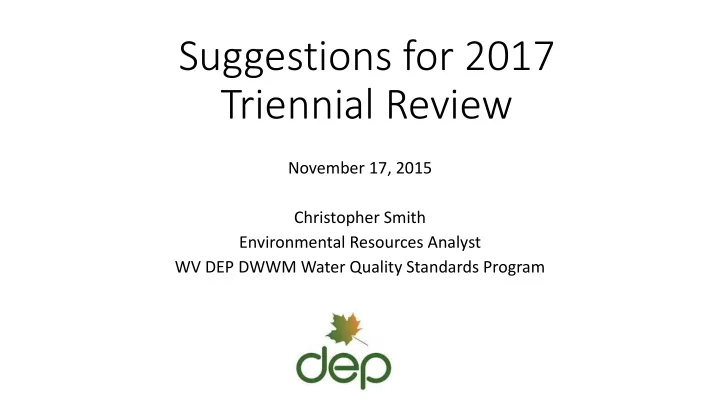

Suggestions for 2017 Triennial Review November 17, 2015 Christopher Smith Environmental Resources Analyst WV DEP DWWM Water Quality Standards Program
Public Comment Period On August 25, 2015 DEP held a public meeting in which we requested suggestions from the public regarding subjects for consideration for our upcoming 2017 triennial review DEP received comments until September 30, 2015 A total of 39 comments were received from 18 commenters This presentation provides a brief summary of the comments received
Public Comments: Category A Designation Category A designation of all waterbodies is not appropriate DEP should support all of its specific use designations with appropriate evidence DEP should maintain Category A use designation for all rivers and streams
Public Comments: Methylmercury and Thallium Evaluation of the methylmercury fish criterion for compliance is not defined in the WQS rule. Current methylmercury WQS of 0.012 µg/l is too low. Water quality-based effluent limits (WQBELs) are expressed as total mercury to protect for a criterion that is based on the most toxic, bioavailable form of mercury (methymercury). The drinking water and drinking water/fish consumption human health criteria for thallium should be removed from the WQS rule
Public Comments: Design Flow for Calculation of Wasteload Allocations Harmonic mean flow should be used for the calculation of wasteload allocations instead of 7Q10 WQBELs are set in a manner which can cause NPDES permit effluent limits to be exceeded due to the concentration of pollutants in intake water
Public Comments: Mixing Zones DEP should consider revising the size limitations for calculating mixing zones that govern human health-based water quality standards.
Public Comments: Narrative Water Quality Criteria DEP needs to develop a method to assess impairment with respect to the state’s narrative water quality criteria.
Public Comments: Antidegradation WV’s WQS rule does not appropriately implement antidegradation to protect narrative criteria in receiving streams. TDS, Conductivity and Sulfate numeric criteria are needed
Public Comments: Copper Copper limits are too stringent and very difficult for some dischargers to meet. DEP should consider adopting the Copper BLM
Public Comments: Bromide WV should adopt a bromide standard
Public Comments: Algae WV needs algae standards that are protective of recreational uses as well as drinking water uses.
Public Comments: Bacteria DEP should consider revising its fecal coliform bacteria criterion to be consistent with EPA recommendations of using E. coli or enterococci.
Public Comments: Aquatic Life WV should consider whether the following criteria should be adopted into the WQS rule to protect aquatic species in the state: Carbaryl, Acrolein, Diazinon, Nonylphenol and Tributyltin. As DEP reviews its aquatic life criteria, it should consider the level of protection the national water quality criteria recommendations offer threatened and endangered species in WV
Public Comments: Ammonia DEP should review its ammonia criteria taking into account the more recent EPA recommendation.
Various Other Public Comments Water quality parameters tend to vary with depth. Pollutant concentrations tend to change with flow. Spills could be considered violations of water quality standards and treated accordingly. DEP should consider the EPA’s 2015 Updated Human Health criteria recommendations DEP has adopted revisions to the regulations governing coal-related NPDES permits and should do the same for the regulations governing non-coal NPDES permits.
Recommend
More recommend